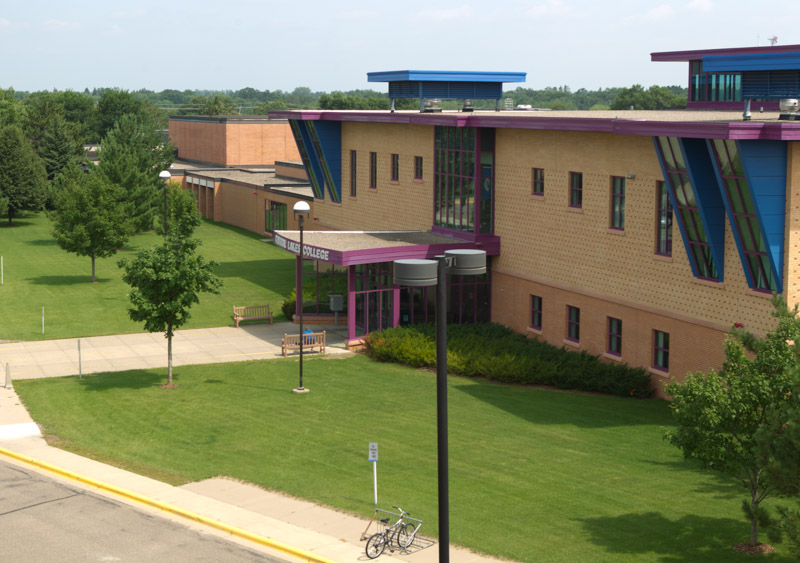Sociology Transfer Pathway A.A. Degree
Program Description
Sociologists study human’s social lives, activities, interactions, processes, and organizations within the context of larger social, political, and economic forces. They examine how social influences affect different individuals and groups, and the ways organizations and institutions affect people’s lives. The Sociology Transfer Pathway provides a broad base of general education relevant to sociology careers, and prepares students for transfer to a designated Sociology bachelor’s degree program at Minnesota State universities. The sociology major teaches students how to think about individuals, groups, institutions, communities and societies in all of their complexity and interconnectedness and how to use the scientific method to ask and answer social research questions about these entities using data. Employers seek to hire candidates with strong analytic and communication skills, who can think creatively about problems, work in collaborative environments, and leverage diversity to maximize success for their organizations and employees.
Program Outcomes
Graduates will be able to:
- Identify and explain key concepts in Sociology;
- Apply key concepts in Sociology to real world examples;
- Identify and explain major theoretical perspectives in Sociology;
- Analyze social phenomena using theoretical perspectives;
- Apply a Sociological Imagination to social issues;
- Identify and explain the causes and consequences of social inequalities;
- Compare and contrast societies based on social structure, institutions and culture; and
- Identify and describe the research methods used in Sociology.
Transfer Opportunities
The Sociology Transfer Pathway A.A. Degree offers students a powerful option: the opportunity to complete an Associate of Arts degree with course credits that directly transfer to designated Sociology bachelor’s degree programs at Minnesota State universities. The curriculum has been specifically designed so students completing this pathway degree and transferring to a Minnesota State university may enter with junior-year status. Courses in the Sociology Transfer Pathway associates degree will directly transfer and apply to the designated bachelor’s degree programs. Students should consult with an advisor for guidance regarding how to best meet the requirements of their intended baccalaureate program. Universities within the Minnesota State system participating in the Sociology Transfer Pathway include:
• Bemidji State University – BA
• Metropolitan State University – BAS
• Minnesota State University, Mankato – BA/BS
• Minnesota State University, Moorhead – BA
• Southwest State University, BA
• St. Cloud State University – BA
• Winona State University – BA
Graduation Requirements
In addition to the program requirements, students must meet the following conditions in order to graduate:
- College Cumulative GPA Requirement: cumulative grade point average (GPA) of credits attempted and completed at CLC must be at least 2.0;
- Residency Requirement: students must complete 25% of their credits at Central Lakes College.
Employment Statistics
For more information regarding employment statistics, career salary information and estimated job growth, follow the resource links below:
https://apps.deed.state.mn.us/lmi/ces/
http://www.bls.gov/ooh/home.htm
Salary information from indeed.com

Program Course Requirements
Required Discipline Courses (9 credits)
SOCL 1401 Introduction to Sociology (Goals 2,5) OR
SOCL 1403* Honors Intro to Sociology (Goals 2,5), 3 cr
SOCL 1472 Sociology of the Family (Goal 5) OR
SOCL 2405 Criminology (Goal 5), 3 cr
SOCL 2481 Race, Ethnicity and Oppression (Goals 5,7B) OR
SOCL 2411 Social Problems (Goals 5,9), 3 cr
Required MnTC Courses
An A.A. degree requires a minimum of 40 credits, complete all ten goal areas and a cumulative 2.0 GPA for the Minnesota Transfer Curriculum (MnTC).
Goal 1 – Communications, 9-11 cr
COMM Any 14XX or 24XX COMM course
ENGL 1410 Composition I (Goal 1) OR
ENGL 1420* Honors Composition I (Goal 1)
ENGL 1411* Composition II (Goal 1) OR
ENGL 1421* Honors Composition II (Goals 1,9)
Goal 2 – Critical Thinking**, 1 course
Goal 3 – Natural Sciences, 6 cr
2 disciplines recommended, 1 lab course required
Goal 4 – Math/Logical Reasoning, 3-5 cr
MATH 1460* Introduction to Statistics (Goal 4) OR
MATH 1461* Honors Intro to Statistics (Goals 2,4)
Goal 5 – History/Social Behavioral Sciences, 3 cr
6 credits are met with required courses. For the remaining 3 credits, choose any discipline other than SOCL.
Goal 6 – Humanities and Fine Arts, 9 cr
2 disciplines required, 3 recommended
Goal 7 – Human Diversity or Race, Power & Justice**, 1 course
Goal 8 – Goal Perspective**, 1 course
Goal 9 – Ethic and Civic Responsibility**, 1 course
Goal 10 – People and The Environment**, 1 course
Fitness for Life, 2 cr
HLTH or PHED Fitness for Life course
Student Success, 1-3 cr
CCST 1550 Introduction to College recommended
Electives, as needed to total 60 credits
*Denotes Prerequisites
**Many courses from Goals 1 – 6 also meet Goals 7 – 10. Credits count only once. Students are advised to select MnTC courses with multiple goal assignments whenever possible.
GRADUATION REQUIREMENT – 60 CREDITS
Program Instructors
| Photo | First Name | Last Name | Position | Department | Phone | Alt. Phone: | URL | wdt_ID | Details | |
|---|---|---|---|---|---|---|---|---|---|---|
 |
Aubrey | Beadell | Advisor | TRIOStudentSupportServices | (218) 855-8014 | aubrey.beadell@clcmn.edu | 1 | More details | ||
 |
Nick | O'Reilly | Occupational Skills Program College Lab Assistant | OccupationalSkills | 218-855-8077 | Nicholas.oreilly@clcmn.edu | 2 | More details | ||
 |
Kevin | Lomax | Automotive Lab Assistant | Automotive Faculty | 218-855-8000 | KLomax@clcmn.edu | 3 | More details | ||
 |
Jody | Flynn | Accessibility Services Assistant | Accessibility | 218-855-8056 | jody.flynn@clcmn.edu | 5 | More details | ||
 |
Deana | Bobzien | Instructor | CollegeCareerStudies - Mathematics - Supportive Services | 218-855-8339 | deana.bobzien@clcmn.edu | 7 | More details | ||
 |
Brianna | Rajkowski | Advisor | TRIOStudentSupportServices | 218-855-8228 | brianna.rajkowski@clcmn.edu | 8 | More details | ||
 |
Tajia | Anderson | PSEO Specialist | Admissions - CollegeCreditInHighSchool- PSEO | (218) 855-8079 | tajia.anderson@clcmn.edu | 10 | More details | ||
 |
David | Gray | Instructor | History | 218-855-8189 | david.gray@clcmn.edu | 14 | More details | ||
 |
Jim | Nagy | Adjunct Instructor | GraphicDesign | 218-855-8157 | james.nagy@clcmn.edu | 15 | More details | ||
 |
Brandon | Schneider | Instructor | HeavyEquipment | 218-894-5179 | brandon.schneider@clcmn.edu | 16 | More details | ||
 |
Natalia | DePauw | Director of Dual Enrollment | PSEO - CollegeCreditInHighSchool - Advising | 218-855-8263 | natalia.depauw@clcmn.edu | 18 | More details | ||
| Amy | Disterhaupt | Admissions Specialist | Admissions | 218-855-8250 | amy.disterhaupt@clcmn.edu | 20 | More details | |||
 |
Nick | Heisserer | Dean of Brainerd Career & Technical Programs | Administration | 218-855-8067 | nick.heisserer@clcmn.edu | 21 | More details | ||
 |
Matthew | Krueger | Environmental Health and Safety Officer | Maintenance - Security - Safety | 218-855-8115 | matthew.krueger@clcmn.edu | 22 | More details | ||
 |
Mark | Lindquist | Instructor | Music | 218-855-8203 | mark.lindquist@clcmn.edu | 23 | More details | ||
 |
Jeremy | Goddard | Bookstore/Print Shop | Bookstore Supportive Services | 218-855-8146 | Jeremy.Goddard@clcmn.edu | 25 | More details | ||
 |
Sarah | Jennissen | Instructor | PracticalNursing | 218-894-5308 | sarah.jennissen@clcmn.edu | 26 | More details | ||
 |
Cash | Robinson | Academic Advisor | Advising | 218-855-8035 | cash.robinson@clcmn.edu | 28 | More details | ||
 |
Ryan | Wright | Enrollment Representative | Admissions - CampusTours | 218-855-8013 | ryan.wright@clcmn.edu | 31 | More details | ||
 |
Steve | Wenzel | Instructor | PoliticalScience | 218-855-8073 | stephen.wenzel@clcmn.edu | 32 | More details | ||
 |
Julie | Woitalla | Instructor | NursingASDegree | 218-855-8168 | julie.woitalla@clcmn.edu | 33 | More details | ||
 |
Josh | Zaborowski | Upward Bound Advisor | TRIOUpwardBound - Assessment | 218-855-8032 | joshua.zaborowski@clcmn.edu | 35 | More details | ||
 |
Paul | Zimmerman | Instructor | Diesel Faculty | 218-894-5143 | paul.zimmerman@clcmn.edu | 36 | More details | ||
 |
Ed | Uhlenkamp | Instructor | FarmBusinessManagement | 218-894-5160 | edward.uhlenkamp@clcmn.edu | https://dynamicforms.ngwebsolutions.com/ShowForm.aspx?RequestedDynamicFormTemplate=32c40b45-028c-46d6-9f79-9c1edc503713 | 38 | More details | |
 |
James | Velde | Instructor | FarmBusinessManagement | 218-234-3981 | james.velde@clcmn.edu | https://dynamicforms.ngwebsolutions.com/ShowForm.aspx?RequestedDynamicFormTemplate=cff3bff4-005f-4f5c-82a8-4c6aed02c8e9 | 39 | More details |
Photo:
First Name:
Last Name:
Position:
Phone:
Email:
